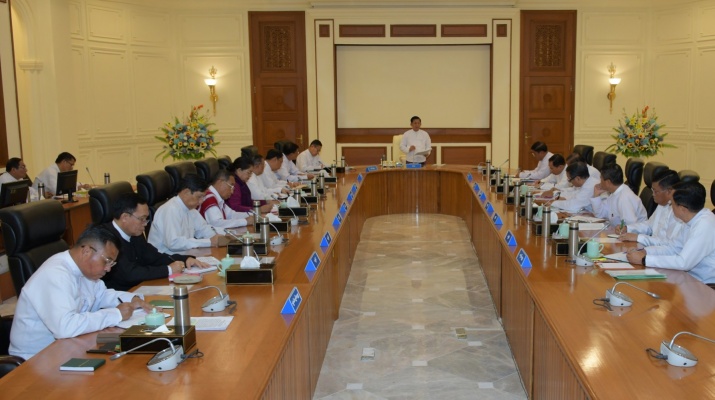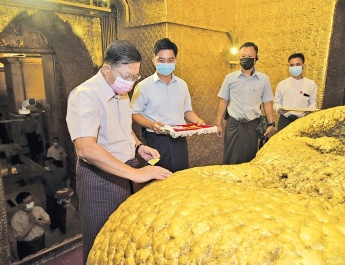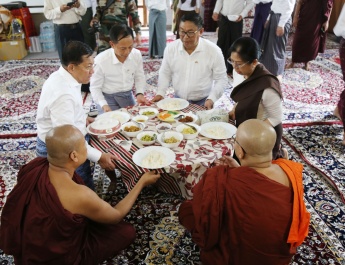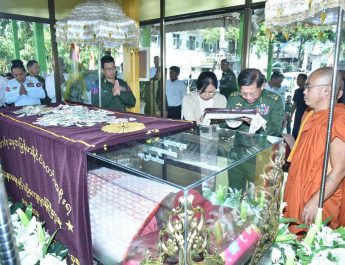NAY PYI TAW September 1
The State Administration Council held meeting 3/2023 at the meeting hall of the SAC Chairman Office in Nay Pyi Taw this morning, with a address by SAC Chairman Prime Minister Senior General Min Aung Hlaing.
Also present at the meeting were SAC Vice Chairman Deputy Prime Minister Vice-Senior General Soe Win, Secretary Lt-Gen Aung Lin Dway, Joint Secretary Lt-Gen Ye Win Oo, council members and officials.
All ethnic people must be educated in building the Union based on democratic and federal systems
First, the Senior General delivered a speech, saying that at a time when the state of emergency of the country has been extended for further six months, this is the second meeting for the council formed with new members. During the tenure, handing over the State responsibility to the government elected by the election and paving the regular way for the State are the primary duties of the current government. At present, the state of emergency exceeds more than two years.
Although the current government is taking the State responsibilities in the state of emergency, it is necessary to develop political, economic and social affairs in conformity with the current situation. No measure must be halted. If not, the halted arenas will be lack behind development.
The political vision of the State is to cement the genuine, disciplined multi-party democratic system and build a Union based on democratic and federal systems. The first point of the five-point Roadmap newly adopted by the State Administration Council mentions:
“Emphasis will be placed on ensuring peace and stability and the full rule of law across the whole Union, and on successfully conducting a free and fair multi-party democratic general election.” Building the Union based on democratic and federal systems cannot be separable with democratic system and federal administration.
The federalism is being based on region but races.
All implementers, leaders and followers must have knowledge and techniques in building the Union based on democratic and federal systems. Hence, the Senior General said he urged all to encourage education sector.
With regard to the education sector, all ethnic people must be literate and completed school education. There are 13,879 basic education middle schools and 21,550 primary schools in rural area across the nation and 1,626 BEMSs and 3,318 BEPSs in urban area. Hence, ratio of BEMS in rural to urban is 8:1 and BEPS 6.5:1. Myanmar has 28 percent of urban people and 72 percent of rural people.
In reviewing the ratio of urban to rural for basic education schools, the successive governments have been emphasizing the education sector. But, number of literates in urban area is larger than those of rural area. Primarily, number of students is lesser in rural area despite opening schools, and most of those students do not learning the completion of basic education.
The ethnic areas, especially in rural areas of states can be seen with lesser number of those who completed the school education due to language barrier and lack of encouragement for learning.Hence, the government has to promote education qualification of rural people.
As now is education age, everybody needs to complete education for their living standard.
As such, priority must be given to ensuring higher education qualification of ethnic people. In the past, the country launched 3-Rs courses with remarkable success, designated as a model across the world.
3-Rs course will stimulate the people to read literature and then they will be keen to learning.
They can be taught in KG+5 as alternative education. The Tatmadaw has an example on achieving success in 2014. And then, they can be taught the KG+9 scheme. As such, it is necessary to beef up the endeavors step by step. The government needs to consider it in the mission of education promotion.
Laws emerge from rules and disciplines. All the people of Myanmar should become educated in their efforts to bmarch towards a union based on democracy and federalism.They need to have legal knowledge.
This is why the universities are teaching legal subjects. BA (Law) has been arranged while plans are underway to teach for LLB in at least a university each in the various regions and states.
I believe that the increasing number of those having basic legal knowledge will yield benefits in politics.
Nurturing human resources to boost agriculture, livestock breeding and productivity for national economic growth When it comes to the national economy, our country needs to systematically engage in manufacturing based on agriculture.
The GDP is related to three major sectors—agriculture, industry and service. Industry and service are based on productivity.
Raw materials are required for producing goods.
With those raw materials, other businesses can be operated.
Land and water natural resources and products derived from agriculture should be upgraded to high-quality industrial products.
Products from agriculture and livestock breeding are indeed raw materials for the country’s manufacturing sector.
Therefore, our productivity can develop by improving the already existing agricultural and livestock resources. In this context, the country needs experts in the related subjects.
The SAC tried to establish more universities, colleges, institutes and schools capable of producing those skillful and experts as it found out when starting to assume State duties that the country had few human resources in the industry sector.
The first point of the social objectives of the newly adopted SAC’s nine objectives is “to implement the multi-education system inclusive of all so as to develop intellectual and intelligence of the entire people and turn out the number of technicians contributing to the manufacturing sector.” Efforts must be made to nurture experts in the manufacturing sector. This means that those who have completed primary and middle school education are trained to be skilled in industry, agriculture and livestock breeding when they reach the high school education level. Then they will be able to acquire greater skills from the institutes, colleges and universities.
The economics subject is also being taught at universities.
The aim is to turn out those having basic business knowledge and experts in economics.
By doing so, there will be more human resources having economic outlooks, thereby contributing to the national economy.
Produce human resources skilled in manufacturing high-quality products The effort for national economic progress requires a lot of human resources that can promote the manufacturing sector. The country’s GDP was 78.9 billion nine 2019-2020, which was much lower than that of the neighboring and regional countries. The GDP value depends on the manufacturing of value-added goods and services.
This is why we are encouraging the production of goods based on agriculture and livestock and then the service sector. In comparison with other countries, our country has weaknesses in its products, per-acre yields and cropping capacity This might have resulted from a lack of hard work and fewer job opportunities. The weakness of creating job opportunities has two parts—input and incentive.
Therefore, in carrying out tasks, efforts must be exerted to achieve success. To do so, opportunities must be created and rewards must be offered.
It is the responsibility of the government to provide inputs and to create incentives. Economic strength must be boosted without fail. In doing so, measures must be taken to nurture economists and technicians who can contribute to production.
As education must be accessible to nurture them, agriculture and livestock breeding and technical high schools have been opened. If such measures are taken fully, the power of education and economy will be stronger in the future.
In connection with exports, it was found that the country’s exports fail to fetch good prices because of weaknesses in production technology. As quality products only will fetch good prices, technologies applied in the country must be advanced ones. Moreover, efforts must be made to produce goods to meet the demand.
To hold free and fair multi-party democracy general election
The ultimate aim of the SAC is to hold a free and fair multiparty general election. To hold a free and fair multi-party general election successfully, stability must be restored in the entire country. To guarantee suffrage in the entire country without gap, basic data for voters’ list must be recompiled. Only when the basic data are correct, will voters’ lists be accurate.
Reviewing the incorrect voters’ lists in the previous 2020 general election, the population growth of the country in 2014 stood at 0.8 percent and eligible voters’ lists in the 2020 general election should have been calculated based on the population growth rate. However, there were numerous irregularities in the voters’ list issued then. Therefore, concerted efforts must be made to compile correct and accurate voters’ lists in the upcoming election.
Necessary preparations must be made in late 2023 and population census must be conducted in the entire country in 2024. Population lists will be available only after population census have been conducted in the entire country and voters’ list can be compiled. There are some townships in regions and states in which voters’ list cannot be compiled because of disturbances to officials who are responsible for compiling voters’ lists. Therefore, continue efforts must be made to compile voters’ lists to their full extent and only when voters’ lists are compiled to their full extent, will correct voters’ lists be available and can election be held properly. Although an election can be held forcefully, concerted efforts must be made so that the one we are going to hold is a proper general election that will strengthen democratic system. There are misunderstandings about democracy and demanding democracy through violent means is inappropriate.
Members of the SAC are required to push for completion of compiling population lists as soon as possible when they go to respective states and regions and to make concerted efforts for the sectors to promote educate, boost economy encourage regional development.
Afterward, members of the SAC reported to the Senior General on the need to take measures to restore the rule of law, security and regional stability in Kayah State, to provide relief items to displaced people, to teach curricula approved by the government to their full extent in basic education schools in Shan State (North),to conducts capability-enhancement courses and offer supports required for human resource development for government employees and enact laws to prevent inaccurate voters lists and irregularities in the upcoming election.
The Vice-Senior General discussed the need to take the united force of local people through cooperation in enforcing area-wise rule of law and restoring peace and stability and to apply the force effectively.
In his closing address, the Senior General said SAC will continue to take appropriate measures for health, education, social and economic development of the country. Local people should be organized to ensure peace, stability and the rule of law of their relevant places. A comparison between a peaceful and stable place and a place which lacks peace and stability shows a wide gap development between the two in regional and socioeconomic progress. Although the government is endeavoring for equal development of the entire nation, sector-wise development undertakings cannot be carried out in places where there is terrorism. Local people are now facing the consequences of the absence of progress. Local people fall victim to the stupidity of a group of people. People should cooperate in anti-terrorism activities and in restoring peace and stability in view of the interest of their areas and regions. SAC members should give supervision at all levels, represent national races region wise and look into their needs.
In this way SAC members can enhance their trust and conviction In implementing the peace process, EAOs should show goodwill for the nation. All the national races should join hands in practicing multiparty democracy and building a Union based on democracy and federalism.
The coming 15 October is the eighth anniversary of NCA.
NCA was signed in the presence of the government, parliament, Tatmadaw and EAOs, and diplomats from UN and countries including China, India, Japan and Thailand and local witnesses at a grand ceremony on 15 October 2015.
It is an ever valid agreement approved by the Union Hluttaw.
The Senior General was a signatory from the government side as the Commander-in-Chief of Defence Services.
But now, an official of a certain EAO made irresponsible and worthless remarks against the NCA without any proof. As regards the peace process, the Tatmadaw firmly stands by the NCA. In all seriousness, the NCA 8th anniversary which falls on the coming 15 October will be organized practically and meaningfully.
The relevant ministries hold talks to provide necessary support and conduct efficiency courses in seeking ways for human resources development of the departments.
Preparations should be made to collect voter lists and ensure all eligible voters to cast votes for the successful holding of a free and fair election. Electronic voting system will be used for the safety of voters.
As regards the political parties, necessary laws will be enacted as necessary.
Farm mechanization will solve the labor shortage of the agriculture sector. Seeds, soil, water and proper methods are required for success ofv agriculture. The relevant ministries are holding talks to establish a polytechnic institute to teach applied science subjects, and to reach technical institute level from Kg+9. Plans should be adopted to produce human resources and technicians for the production industry. Better education for youths ensures a better future for the country.
SAC is doing all that are necessary for the betterment of the country’s future. SAC members should have a wider view, taking into account the interest of the entire country to represent and work for all the places of the country.





